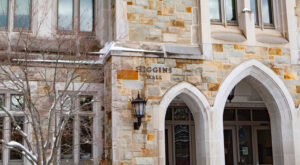The National Science Foundation (NSF) has awarded Boston College a five-year, $25 million Science and Technology Center grant to fund research into ocean ecosystems and climates in collaboration with many other universities, including Boston University and the Massachusetts Institute of Technology.
The grant is intended to foster interdisciplinary work that connects oceanography and the data sciences with education, according to Laura O’Dwyer, a professor in the Lynch School of Education and Human Development.
“We are all working to create … interventions that allow us to increase ocean literacy and appreciation of data, and understanding how empirical evidence can be interpreted,” O’Dwyer said.
O’Dwyer described the months of proposals, pre-proposals, site visits, and questions she and her peers had to answer in order to receive the grant. There were many late nights spent with members of the NSF board explaining the potential work participating universities could do together if they received the money, she said.
“This was the most involved process that I have ever experienced,” O’Dwyer said.
O’Dwyer’s specific position within this grant is in K-12 education, so her work will be dependent on what discoveries scientists make that may be helpful for educators.
“We have not defined on my side what we are going to look at yet,” O’Dwyer said. “It will be at the mercy of the scientists for the studies they do to provide innovations that we can use in schools.”
What she does know is that her focus with education is going to be in translating scientific discovery into inquiry for students at different grade levels.
“We are going to focus, most likely, on scientific inquiry, and providing students in K-12 opportunities for conducting real life analyses with data,” she said.
A common trap that educators fall into when trying to implement new research into a child’s learning: developing a new curriculum instead of working with existing curriculum that already works, according to O’Dwyer.
“What we don’t want to do is spend our time developing curricula that might not work,” O’Dwyer said. “What we are hoping to do is leverage pre-existing curricula that is available so we can slide in some of the research and empirical work.”
The data that scientists intend to collect with this grant will concern a large range of fields, O’Dwyer said, but the main focus is on carbon transfer and carbon sinks, which are processes by which carbon is withheld and released into the atmosphere.
“This whole center is about carbon transfer,” O’Dwyer said. “What we are trying to understand is how the carbon sink mediates all of the various biochemical, microbiological, and climate issues.”
O’Dwyer said that one of the possible long-term benefits of exposing kids to this research may be improved environmental advocacy.
“What we would expect is to increase knowledge with the hope that over time that knowledge leads to greater advocacy,” O’Dwyer said.
When asked about the first steps for the education department within this program, O’Dwyer spoke about upcoming meetings with the scientists out in the field over the next few weeks.
“Over the coming weeks, we are going to set up a meeting with all the scientists and ask, ‘Where can you see a connection between what you are doing, and K-12?’” O’Dwyer said. “‘Where can you see a connection between what you are doing and experiential opportunities?’”
Overall, she said she is grateful for this opportunity to be able to translate important ocean research and grant resources into something vital in the education of children.
“It is one of those things that happens where you get an email or phone call, and someone invites you to collaborate,” she said. “And just to say ‘yes’ and see where it leads you.”
Featured Image by Vikrum Singh / Heights Editor




